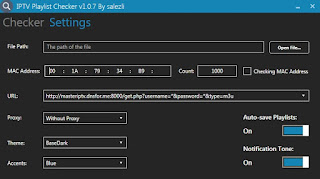Iptv Brute Force Checker 1.1 Download
Iptv v1.1- search and brute force illegal iptv server. Iptv v1.1- search and brute force illegal iptv server. Iptv v1.1- search and brute force illegal iptv server. ODIN is still in active development, so check the dev branch for the bleeding edge. BruteSploit - Collection Of Method For Automated Generate, Bruteforce And.
Windows GUI version of iptv tool
Disclaimer
This program is just a demo. DO NOT USE IT FOR PERSONAL purpose Skyrim special edition ps4 vs pc 3.
Usage
Requires .NET Framework 4.5.2
Download a release from: here
Extract it somewhere
Open IPTV Sharp.exe
Select a server from target selector or input your own
Click on 'Attack' (this can take up from 5/10 minutes to a very huge time, depending on target website and dictionary size)
Take some popcorns
Check output directory for cracked channel
(When a server doesn't give you any accounts just try another one)
Credits
This version was coded by: @Arm4x and @Delfioh
IPTV/PirateCrew team: @Arm4x@Pinperepette@Ludo237
C Force Iptv
I created a fun password cracker using literal brute force, searching each character to see if it matches an ASCII character 0123456789abcdefghijklmnopqrstuvwxyzABCDEFGHIJKLMNOPQRSTUVWXYZ. The password is randomly generated and will vary from 100,000 to 250,000 characters long. I use a wrapper timeit function to time the function and the output is a basic print statement using .format():
Iptv Brute Force Checker 1.1 Download Pc
An example output (without the password):
So my questions are:
Am I following coding standards for Python 2 (like PEP8)
Is there anyway to improve performance, readability, etc.
Is there any way to make my code more 'Pythonic' (like a native Python coder)?

2 Answers
$begingroup$I'll answer your first question separately. However, since your second and third questions are closely related, I'll give the same answers to both questions.
Am I following coding standards for Python 2 (like PEP8)

For the most part, your code complies with PEP8,
- Spaces between operators
- Two newlines between function definitions
- Variables are lowercase with underscores as needed
- etc..
The only thing I'd suggest is to break some of your longer statements up - such as your print statement at the end of your script - onto separate lines, with each separate line being indented.
However, even if sometimes you choose not to comply with a certain coding standard, make sure you are consistent with your naming conventions. I've seen Python code which is written Java style, but is still easy to read because the author was consistent in their style.
Is there any way to make my code more 'Pythonic' (like a native Python coder)? and Is there anyway to improve performance, readability, etc.
Instead of having the
list_of_charsvariable, make use of thestringmodule which already defines all alphanumeric characters:Don't use global variables. There is rarely ever a good reason to use them. Instead of making
attempted_passwordglobal, define it local to thesolve_password()function. This makes much clearer whereattempted_passwordis used.Inside of your first
for-loop, you never use the variableletter. Instead, simply use the variable_which conveys to the reader that your only using this loop for code repetition:The builtin
range()function will already start from zero if no other start value is specified. So there is no need to explicitly do it yourself:
Whenever you are doing string addition in Python, you are probably doing it wrong. It is very slow, due to strings being immutable. Because of this Python will have to create a new string everytime you do string addition and copy over the content of the two strings you are adding.
As a fix, just use list and str.join. Also, creating a password from a possible list of characters is something you might want to do again, so I would put it into a function.
This can be even further simplified using random.sample: